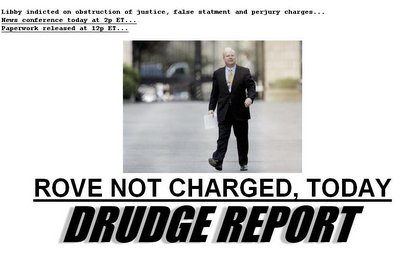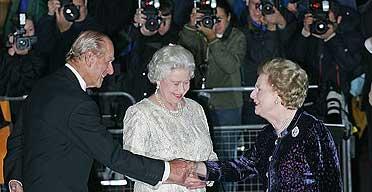
New Labour and Blair have finally reached fully circle. After 7 years of reform after reform in all areas of public service, constant revolution of which even Trotsky would disapprove of, Labour has decided to re-introduce failed Tory policies of old, namely grant-maintained schools and partial selection. Before we get ahead of ourselves, we should recognise that there are some decent and admirable policies in this white paper.
(Reports on the white paper are available
here,
here and
here.)
• Teachers will be required to keep parents updated on progress at least three times a year.
• More one-to-one tutition for struggling pupils, intensive support for children who have problems with English and Maths.
• Free bus transport for children from low incomes to schools within six-mile radius
• Err...... that's it.
Yes, a whole three worthwhile and admirable proposals. Free bus transport should have be introduced a long while ago, but nonetheless is a very welcome reform. English and Maths help will maybe shut the cretins at the CBI up who bang on about failing standards, and compulsory updates will help children to improve with parent support.
So then, what about the other proposals which the government has come up with?
Well, the banding proposal which Roy Hattersley wrote about and I was so enthusiastic about has predictably not been made compulsory. Schools only have to 'take note' of it. In other words, they'll ignore it completely. I should have known that Labour wouldn't take the likes of the Daily Mail on over such a measure that could truly transform education. Further making sure that this measure will be ignored is the proposals to more or less abolish Local Education Authorities, the only bodies which would have been able to enforce the banding measures. In fact, councils who run the authorities will now have to listen to every whim of every selfish parental demand, and the government has pledged that if councils refuse to listen that they'll pull them into line.
The whole paper is based around 2 major ideas. The first is that the new 'City Academy' schools are working and improving standards. There is no evidence that they are as yet, with some of them actually having worse results than the schools they replaced. Similar to the Academy system, where a business or organisation puts money into the school and has the right to say how it should be run or by whom, the new trust schools will be backed by business, "faith" groups, or parental organisations. GEMS, a group which already runs numerous private schools, has said it is interested, as is the United Learning Trust, a Christian group. This is a boon to them; they can impose their ethos and ideology on kids without having to charge them for the privilege. What's not to like for such groups?
The second major idea is that parents know what is best for their kids and that they are demanding further power. Any parent obviously wants the best for their child, and many middle class parents have shown how far they will go to get their offspring into the "right" school. This paper is made to appeal directly to them, but it will most likely fail both them and low-income families which Labour is supposed to be so obsessed with helping. Parents will be able to demand "new" schools, presumably without having to worry about the cost, to close "failing" schools and to demand the sacking of headteachers. "Failing" schools will have to drastically improve within a year, otherwise they will be taken over or shut down. This ignores the fact that the problem may not necessarily be with the teachers, but with the students themselves, but let's ignore that. Will the threat of closure and loss of jobs, with the stigma attached to it really encourage teachers and the governors to fight to keep the school open, or will it utterly demoralise them and result in a self-fulfilling prophecy? I have a funny feeling it may result in the latter. As well as parents being able to demand what they think is best for their little Johnny, once a trust school is set up they'll be able to join a council alongside the governors and influence policy on uniform and discipline. In other words, expect schools to become even more fascistic, with drones being pumped out all dressed the same, stripped of the individuality which such schools are meant to be promoting.
Popular schools will also be able to expand, or take over failing ones. Whether they actually will want to is again questionable. Why would a popular school want to risk losing its reputation by taking over a school with a bad one? Spreading itself too thickly may well lead to a loss of leadership at individual schools, and to failure all round.
In short, Labour has done a fantastic job. It's out-toried the Tories again. They've stolen their ideas. Schools will be more or less back at the secondary modern/grammar school stage. Little will change, as the middle class already swamp the best schools and the working will continue to go to bog-standard comprehensives where they'll fail. Except the bog-standard comprehensive will turn into the bog-standard trust school, run by a business or by a faith group, churning out clones headed straight for the check-outs of Tesco. The changes will allow the middle class parents to block out the attempts of ambitious working class parents to get their children the best education possible. They'll be able to keep out the oiks and the blacks, and they won't even have to pay for it.
Schools in the UK are not failing by any means. They can however improve greatly, and need to. Labour's policies up to the city academy plans have so far improved the education system. This though is a reform too far, as with the government's plans for hospitals. Headteachers are crying out for a stop to the reforms, to let them settle and for less bureaucracy, not more. This is the opposite to what they want. Instead Blair and Kelly will impose more bureaucracy, encourage the outspoken parents to interfere, and cause even more headaches. Despite all this, the Labour backbenches seem to have gone quiet and lost the zeal for rebelling that they had during the last parliament, whether they managed to defeat the government or not. This can be partially explained by more servile Blairites replacing some of the more rebellious lefties, and seats being lost to the Tories, and the fear of being responsible for defeating the government and encurring the wrath of the party. The backbenchers urgently need to forget that. This government has not lost its way as some are saying. The backbenches may have, but the cabinet and the Blairites have not. Blair is determined to impose his legacy now that his premiership is coming to an end. If he wants his legacy to be breaking schools and destroying the NHS, then the Labour MPs should vote for the government's numerous bills now going through parliament. If they want Blair to remembered for his policies on child poverty, introducing the minimum wage and the other good things that have been achieved, they'll vote against. Forget the war as well for a second, and remember the party itself. Labour must now allow itself to become the new Conservatives. At the moment, the clock hands are five to midnight. At midnight, the party will become blue. If the party awakens from its Blairite slumber, it can push the hands back and return red. It can start in the committee stages by making banding compulsory.












